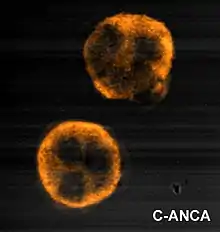c-ANCA
c-ANCAs, or PR3-ANCA, or antineutrophil cytoplasmic antibodies, are a type of autoantibody, an antibody produced by the body that acts against one of its own proteins. These antibodies show a diffusely granular, cytoplasmic staining pattern under microscopy. This pattern results from binding of ANCAs to antigen targets throughout the neutrophil cytoplasm, the most common protein target being proteinase 3 (PR3). For example, PR3 is the most common antigen target of ANCA in patients with granulomatosis with polyangiitis. In active granulomatosis with polyangiitis, c-ANCA is found over 90% of the time.[1] Other antigens may also occasionally result in a c-ANCA pattern.

The granular, cytoplasmic staining pattern of c-ANCA
References
- Thomas M. Habermann (26 June 2006). Mayo Clinic internal medicine review, 2006-2007. CRC Press. pp. 935–. ISBN 978-0-8493-9059-3. Retrieved 1 November 2010.
This article is issued from Wikipedia. The text is licensed under Creative Commons - Attribution - Sharealike. Additional terms may apply for the media files.